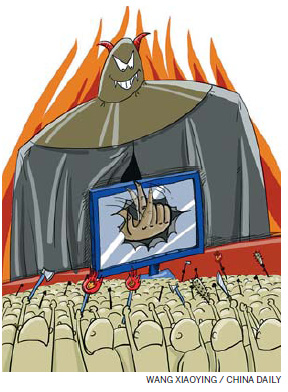View
No one loves the messenger who brings bad news
Updated: 2011-08-18 08:14
By Jules Quartly (China Daily)

As an Englishman (understandably, the Welsh, Scottish and Northern Irish don't want to be associated with us on this one) I was mesmerized by London burning last week and managed to experience it vicariously on social networks - where some of my acquaintances were, literally, having a riot, albeit in Birmingham.
The reaction on China's Sina Weibo microblogging service to the scenes of anarchy was interesting because there appeared to be a consensus that Twitter and Facebook were to blame - the subtext being it was a wise move by the government to ban the social networking sites here.
The notion that micro blogs are a force for evil appears to be gaining ground among governments around the world. Champions of a free press, of which Twitter et al are surely a part, are on the defensive. The UK government and police already have the power to shut down communication providers, so Prime Minister David Cameron did not say much when he threatened to shut down Twitter and BlackBerry Messenger Service if they were used to organize violence.
It's easy to understand why the police would wish them to be censored and why the government, which has a responsibility for public order, would grant this control. Prevent people organizing riots (in one way) and you may improve law and order in the short term, but the underlying causes will remain. A convenient scapegoat has been found, but little of substance has been solved.
Three months ago, I was in England and driving with an old friend who is British, but born in Jamaica, through Handsworth in Birmingham. He predicted there would be riots this year and said the cause would be black resentment of Indians and Pakistanis who had moved into the area and taken over businesses. He claimed Indians or Pakistanis ran the city council, police and courts and blacks could expect no help or justice from them.
It was clear the area had changed from 10 years previous when I was familiar with it. It was difficult to find a black face on the street.
The riots started because the police gunned down a black man in Tottenham, London (like the LA riots in 1992). But even so, in the capital, it seemed to be less about racial tensions than the young have-nots taking stuff the haves have.
The acquaintances of mine (mainly white) who took advantage of the riots did so thinking this was a one-time opportunity and too good to pass up. In the places they live it's like a riot every day, so taking it to the city center and high street was like playing away from home, and the pickings were better. Simply put they are not invested in society, because society has not invested in them.
While the Murdoch press did manage to pick out a rich, white girl and an Olympics ambassador among the rioters and looters, the fact is the rioting was in the poorest, most racially divided, austerity cuts affected places in England. About half of those arrested were under 18 and a third were on remand, basically criminals who had been let out of prison even though they had not served their sentence or been given parole, under a "sunshine" government policy.
Let's be clear, social networks aren't the reason why people riot. They are just an organizational tool, like getting on the phone or printing handbills. Banning them will not change the facts.
On the contrary, you could argue social networks are a valuable way of testing the mood of the public, provide a release valve, are great when it comes to tracking down miscreants, and are used just as widely by the authorities as the dissenters.
Technology and social networks are neither good nor evil, it is to what end we turn them to that is the issue. So, don't shoot the messenger?


Specials

Biden Visits China
US Vice-President Joe Biden visits China August 17-22.

Star journalist leaves legacy
Li Xing, China Daily's assistant editor-in-chief and veteran columnist, died of a cerebral hemorrhage on Aug 7 in Washington DC, US.

Robots seen as employer-friendly
Robots are not new to industrial manufacturing. They have been in use since the 1960s.